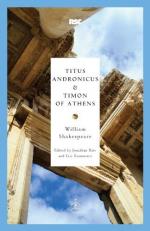|
This section contains 6,176 words (approx. 21 pages at 300 words per page) |

|
SOURCE: Ruszkiewicz, John J. “Liberality, Friendship, and Timon of Athens.” Thoth 16, no. 1 (winter 1975-76): 3-17.
In the following essay, Ruszkiewicz examines Timon's behavior and attitude toward friendship within the context of Renaissance views regarding liberality and friendship.
I
The nature of Timon's character in William Shakespeare's Timon of Athens (1607-08?) has been variously appraised. For G. Wilson Knight, the prosperous Timon is the flower of human aspiration and by nature a universal lover. Other less generous critics like David Cooke and Andor Gomme cite Timon for his pride and wantonness, and Cooke along with G. K. Hunter finds Timon enjoying the self-image of a god. Defending Timon, Paul Siegel suggests that the raving Greek must be a Christ figure since his friends are called Judases. Irving Ribner finds the fault of Timon in the dependable Renaissance formula of the passions overcoming the reason. More moderate assessments of Timon's...
|
This section contains 6,176 words (approx. 21 pages at 300 words per page) |

|


